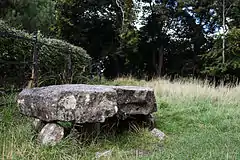Knockmaree Dolmen
Knockmaree Dolmen, or Knockmaree Cist, is a prehistoric site of the Neolithic period, in Phoenix Park just north of Chapelizod, near Dublin, Ireland. Other forms of the name are Knockmary or Knockmaroon Dolmen, or Cnoc-Maraidhe.
 | |
 Shown within Ireland | |
| Location | Phoenix Park, near Dublin grid reference O 10 34 |
|---|---|
| Coordinates | 53°21′3″N 6°20′26″W |
| History | |
| Periods | Neolithic |
Description
The tomb, situated on a small ridge, is a cist, a type of burial chamber found in Ireland on the south and east coast. It dates from about 3000 B.C. to 2500 B.C. A capstone, measuring 1.96 metres (6 ft 5 in) by 1.05 metres (3 ft 5 in), is supported by smaller stones. The capstone is water-worn, and is thought to have come from the River Liffey nearby.[1][2]
It was discovered in 1838, when workmen were employed to remove a tumulus of height 15 feet (4.6 m) and circumference 120 feet (37 m). In the centre of the mound were found the stones now visible; four other cists were found in the outer area.[1][2]
The remains were examined by the Royal Irish Academy, the Academy's report later being delivered by George Petrie.[1]
In the central burial chamber, measuring 1.20 metres (3 ft 11 in) by 0.60 metres (2 ft 0 in), two male skeletons were found in a crouched position. They were almost complete and aged about 40 and 50 years. Grave goods were found including many small perforated sea-shells (of species known then as Nerita litoralis), which presumably formed a necklace, and a flint knife. In the outer cists, an urn and food vessels were found, with fragments of burnt bone and ashes.[1][2]
The tomb is known as a "Linkardstown burial", after a megalithic grave found in the townland of Linkardstown, south-east of Carlow. There is a group of such burials, having mounds of similar size and situated on a hilltop or similar location.[1]
References
| Wikimedia Commons has media related to Knockmaree Dolmen. |
- "Dublin north city Linkardstown burial" Megalithic Monuments of Ireland. Retrieved 20 March 2020.
- "Knockmaree Dolmen, Phoenix Park. Dublin City 1700BC-2500BC" Curious Ireland. Retrieved 20 March 2020.